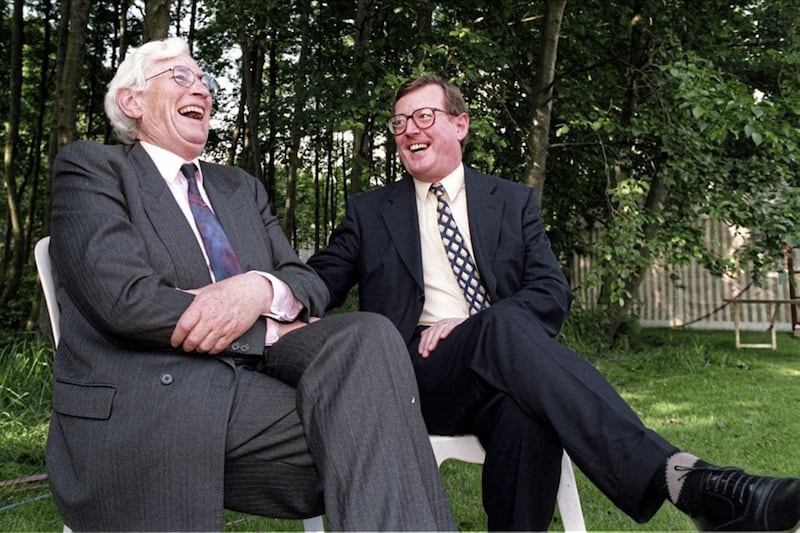There have been a number of comedy films over the years which included a scene about that ultimate nightmare moment of teenage angst: what if you organised a party and nobody turned up? Well — and I think some of you know me long enough to know exactly where I’m going with this — imagine the party-political equivalent of that angst: what if you organised a leadership contest and nobody applied?
The UUP, still the gift that keeps on giving for columnists and commentators, looked as though it might be stumbling into that nightmare. Indeed, on Wednesday morning a lifelong member of the party (he joined when he was 23 and celebrates his seventieth birthday in November) told me that the best way to sort out the ongoing mess was for nobody to apply, thereby forcing some sort of pie-throwing contest (another staple of film comedy) at an emergency AGM, where the last person standing was declared leader. The Custard’s Last Stand option, if you like.
The other option — just as bad in many ways — was that Doug Beattie, the leader who resigned, un-resigned and then resigned again, threw his hat into the ring while everybody else locked their own hats in a nearby cupboard.
Yes, he would win, and everything would go back to what passes for normal in the UUP. But in this case that would mean that the officer team, which accepted both of his resignations, would themselves resign en masse and kickstart an entirely new crisis at the very heart of the party’s leadership structures.
At this point — and I’m writing the column on Wednesday lunchtime — anything seems possible. This is the UUP, after all.
There is already talk of Mike Nesbitt as the ‘favourite’ to succeed Beattie, but I’m not sure what he has to gain by returning to the role almost seven years after he stood down. And would he really want to either step away as health minister or try to combine both roles? Also, I’m pretty sure the party won’t want to revisit ‘Vote Mike and get Colum’ territory.
Deputy leader Robbie Butler and East Antrim MLA John Stewart are also in the frame, possibly even as some sort of tag-team option. Neither has been leader before, which, let’s face it, is something of a novelty status among UUP MLAs.
Ex-leaders bring baggage — both good and bad — with them, so there is something to be said for a clean slate under the present circumstances. Set against that is the argument that this is the moment for an experienced pair of hands at the top: someone who has held the wheel and tiller before.
Bing bing. That’s the noise alerting me, at 1.34pm, to the email announcing that Beattie won’t be standing again: “It would simply not be credible, or right, for me to be re-elected as the party leader. I must accept that while a large number would like me to stay as leader there is an equal number that may not. Going forward, I hope that the new leader can continue to modernise the party.”
It’s the right decision. As I outlined above, his continuing presence in the contest would merely add to the crisis rather than calm it. Also, it will, I hope, pave the way to a proper contest and an honest debate about the party’s future direction.
The rules allow the UUP to switch to opposition: and since the party has more MLAs than the SDLP then its leader would also replace Matthew O’Toole as leader of the opposition. A little rough on him, perhaps, but there are many areas and issues on which both parties could cooperate to mutual benefit
Whoever emerges triumphant — if that is actually the right word to use about this sort of victory — still has to find a way of fixing the party. They could start by walking out of the executive. There are no political/electoral gains to be made by hanging on in there. If there were then the party would surely have done better in the general election.
There’s also a lot to be said about beefing up the opposition. Matthew O’Toole and the SDLP have played their hand remarkably well in the past six months but lack the numbers for an official opposition to be truly effective.
The rules allow the UUP to switch to opposition: and since the party has more MLAs than the SDLP then its leader would also replace O’Toole as leader of the opposition. A little rough on him, perhaps, but there are many areas and issues on which both parties could cooperate to mutual benefit.
The other thing the UUP has to do — and this is the much more difficult challenge — is to steady the ship and calm the collective nerves. There is a pro-union demographic out there which can be attracted by a genuinely middle-of-the-road unionist party: one which doesn’t swerve madly to the exclusivist right every time an election is called.









